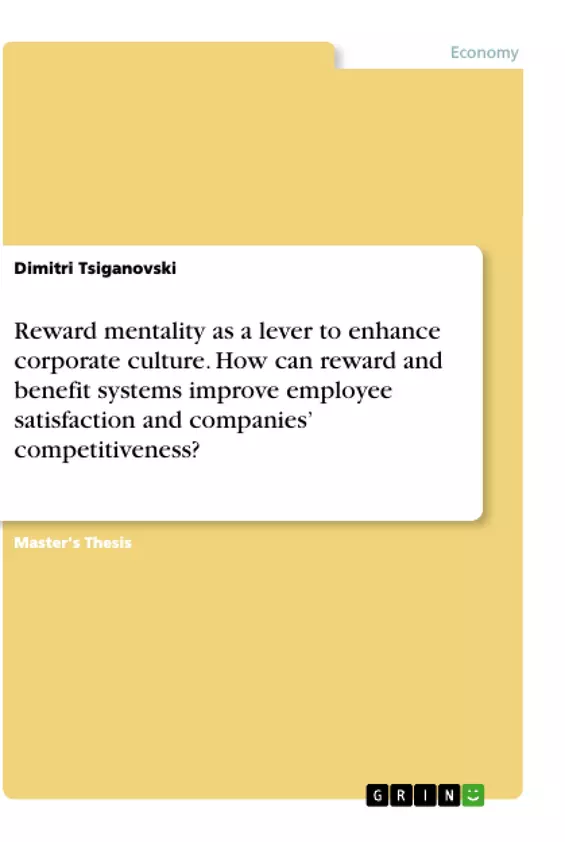To extend the knowledge about the topic ‘rewards’ and to add academic value to the already existing topic-related publications, the research aim of this study was to explore the improvability of reward mentalities in the shipping sector. Specifically focusing a shipping company located in Germany, the research question was based on how they could optimise their reward and benefit systems in the future.
To get a deeper analysis and also to combine given literature to the topic with the current reality, an interview as a form of qualitative data collection was conducted with 14 full-time employees of different hierarchical management levels in four different departments: Sales, Customer Service, IT and Human Resource; deployed in two German offices. The researcher chose the Non-probability Sampling approach focussing on Purposive Sampling and the results were reviewed with thematic analysis through which five main themes came out as a result: overall satisfaction, extrinsic rewards, intrinsic motivation, innovativeness and areas of improvability.
These links significantly helped to combine the findings with the critically discussed literature so that further conclusions were generated. The results showed that the effective strategic use of rewards, especially of extrinsic nature both in a monetary and non-monetary way, have a key role in increasing job satisfaction and enhancing innovative mind-set which can be fuelled into company’s success. Moreover, the findings brought a new perspective on the commonalities and differences of employee’s and management’s view on rewards at work and also delivered new impulses in anticipation on how this and conceivably other companies can improve their reward mentality. In the end, different recommendations were given both for the company and future research.
Inhaltsverzeichnis (Table of Contents)
- Introduction
- Problem definition
- Aim
- Research Question
- Research Objectives
- Dissertation structure
- Literature review
- Introduction
- Rewards as drivers for motivation at work
- Importance of reward systems for employees
- Relationship between rewards and a successful Corporate Culture
- Different reward systems
- Individualistic rewards
- Cooperative rewards
- Monetary rewards and benefits
- Non-monetary rewards and benefits
- Impacts of reward and benefit systems on employee satisfaction
- Psychological and emotional effects
- Positive and negative effects of extrinsic rewards
- Positive and negative effects of intrinsic motivation
- Innovative mind-set: Rewards as influencers of innovative thinking
- Rewards as decisive factors for long-term competitiveness
- Summary of findings
- Methodology
- Research philosophy
- Data collection methods
- Primary data: Semi-structured interview
- Sampling techniques
- Ethical considerations
- Methodological limitations
- Data analysis
- Introduction
- Primary data
- Qualitative data analysis and discussion with links to literature
- Summary and discussion of key findings
- Conclusion and Recommendations
- Conclusion
- Recommendations
- Limitations of the overall research
Zielsetzung und Themenschwerpunkte (Objectives and Key Themes)
This research aimed to explore the improvability of reward mentalities in the shipping sector, specifically focusing on Evergreen Marine in Germany. The study sought to understand how Evergreen could optimise their reward and benefit systems in the future. This was achieved by conducting interviews with employees from different departments and levels within the company.
- The influence of reward systems on employee satisfaction and motivation.
- The relationship between reward systems and a successful corporate culture.
- The impact of rewards on innovative thinking and long-term competitiveness.
- The effectiveness of different reward systems, including both monetary and non-monetary benefits.
- Recommendations for improving reward mentality within the shipping industry, specifically focusing on Evergreen Marine in Germany.
Zusammenfassung der Kapitel (Chapter Summaries)
- Introduction: This chapter sets the stage for the research, outlining the problem definition, aim, research question, objectives, and dissertation structure.
- Literature Review: This chapter provides a comprehensive overview of existing research on reward systems, exploring their impact on motivation, employee satisfaction, corporate culture, and company competitiveness. It examines different types of reward systems and their respective advantages and disadvantages.
- Methodology: This chapter details the research philosophy, data collection methods, sampling techniques, ethical considerations, and methodological limitations employed in the study.
- Data Analysis: This chapter analyzes the primary data collected through semi-structured interviews, focusing on key themes and their relationship to the literature reviewed.
Schlüsselwörter (Keywords)
The research focuses on reward mentality, corporate culture, employee satisfaction, innovation, competitiveness, reward systems, extrinsic rewards, intrinsic motivation, qualitative research, and case study analysis.
Frequently Asked Questions: Reward Systems in Shipping
What is the focus of this research on reward mentality?
The research explores how reward and benefit systems can improve employee satisfaction and competitiveness in the shipping sector, specifically at Evergreen Marine in Germany.
What is the difference between extrinsic and intrinsic rewards?
Extrinsic rewards are external (e.g., salary, bonuses, benefits), while intrinsic motivation comes from the work itself (e.g., job satisfaction, sense of purpose).
How do rewards influence a company's competitiveness?
Strategic use of rewards can enhance an innovative mindset and increase long-term employee loyalty, which directly impacts the company's success.
What methodology was used for this study?
A qualitative approach was used, involving semi-structured interviews with 14 full-time employees from departments like Sales, IT, and HR.
What were the key findings regarding employee satisfaction?
The study found that effective extrinsic rewards (monetary and non-monetary) play a key role in increasing job satisfaction and motivation.
- Quote paper
- Dimitri Tsiganovski (Author), 2021, Reward mentality as a lever to enhance corporate culture. How can reward and benefit systems improve employee satisfaction and companies’ competitiveness?, Munich, GRIN Verlag, https://www.grin.com/document/1167690



